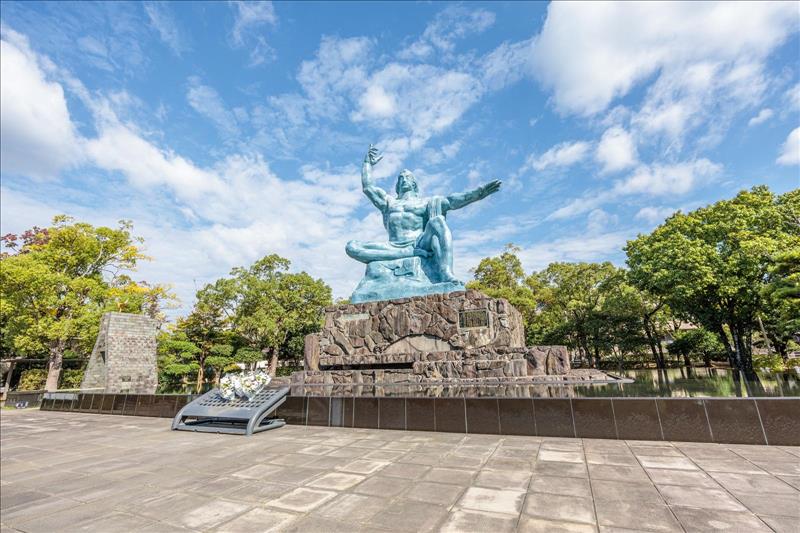
Nagasaki Marks 80 Years Since Atomic Bombing Tragedy
Nagasaki has marked the 80th anniversary of the devastating U. S. atomic bombing that killed tens of thousands of people and left lasting trauma. On 9 August 1945, the city became the second to suffer the horrors of nuclear warfare, after Hiroshima, with many survivors, known as hibakusha, urging younger generations to fight for a nuclear-free world.
The bomb, code-named“Fat Man,” was dropped by the U. S. during the final stages of World War II, ultimately leading to Japan's surrender. However, the devastation it caused endures in the lives of those who survived. Today, survivors continue to battle both physical and emotional scars, while advocating for the global abolition of nuclear weapons.
At the memorial ceremony, held at the Nagasaki Peace Park, Mayor Tomihisa Taue underscored the city's determination to make sure the memory of the bombing is never forgotten, emphasizing the importance of educating the youth about the horrors of nuclear warfare.“The past should never be repeated,” Taue said.“It is vital that we continue to pass down the legacy of the hibakusha to the younger generations.”
Throughout the day, survivors shared their harrowing recollections of the attack, where the atomic bomb exploded over the city at 11:02 AM, killing an estimated 74,000 people instantly, and leaving countless others with injuries and long-term health issues, including radiation sickness and cancers.“Even after the war ended, the atomic bomb brought invisible terror,” said one survivor, whose family lost several members in the bombing.
Nagasaki's commemoration this year is particularly poignant as the hibakusha grow older, with many now in their 80s and 90s. These survivors have long been vocal advocates for the abolition of nuclear weapons. They believe that their first-hand experiences, as painful as they are, can serve as a powerful tool in the fight against nuclear proliferation.
See also Denmark Zoo Seeks Small Pets for Predators' Diet“The hibakusha's mission is not just to tell their stories, but to ensure that no one else suffers as we have,” said Kazuo Oki, the chairperson of the Nagasaki Atomic Bomb Survivors Council. His father perished in the bombing, leaving Oki with a deep-rooted desire to see a world free from the threat of nuclear warfare.
At the commemoration, the global conversation about nuclear weapons remains as urgent as ever. With ongoing tensions between nuclear states, particularly the United States, Russia, and North Korea, the fears that once plagued Nagasaki continue to reverberate across the world. The survivors' calls for disarmament have been echoed by world leaders, but the threat of nuclear conflict remains ever-present, underlined by ongoing military developments.
Several local groups have launched initiatives to remind the world of the potential dangers posed by nuclear weapons. A symbolic moment during the memorial ceremony involved the release of white doves into the sky, a symbol of peace, followed by a minute of silence to honour the lives lost and to reaffirm the city's commitment to peace.
The nuclear disarmament movement in Nagasaki has faced challenges, particularly as younger generations, though empathetic, may struggle to fully grasp the depth of the tragedy. However, activists and local officials are determined to ensure that the horrors of the past are not forgotten, stressing the need for increased education on the issue. The mayor also called for greater support for nuclear disarmament efforts at the United Nations, urging global leaders to take tangible steps toward eliminating nuclear weapons.
See also RIC Dialogue Revival Gains Traction Amid US Tariff PressuresThis anniversary serves not only as a reminder of the suffering caused by the atomic bomb but also as a call to action for those who were not alive during that time. For the hibakusha, passing down their stories is an essential part of ensuring that the world continues to move toward peace.
In addition to government efforts, various international organisations gathered in Nagasaki to show solidarity. Civil society groups have called for more robust treaties to reduce nuclear arsenals, while activists insist that the abolition of nuclear weapons should remain a key focus for the international community.
Notice an issue? Arabian Post strives to deliver the most accurate and reliable information to its readers. If you believe you have identified an error or inconsistency in this article, please don't hesitate to contact our editorial team at editor[at]thearabianpost[dot]com . We are committed to promptly addressing any concerns and ensuring the highest level of journalistic integrity. Legal Disclaimer:
MENAFN provides the
information “as is” without warranty of any kind. We do not accept
any responsibility or liability for the accuracy, content, images,
videos, licenses, completeness, legality, or reliability of the information
contained in this article. If you have any complaints or copyright
issues related to this article, kindly contact the provider above.


















Comments
No comment